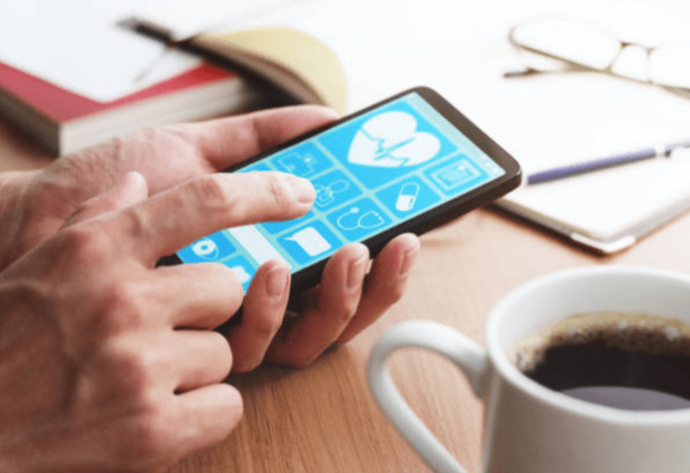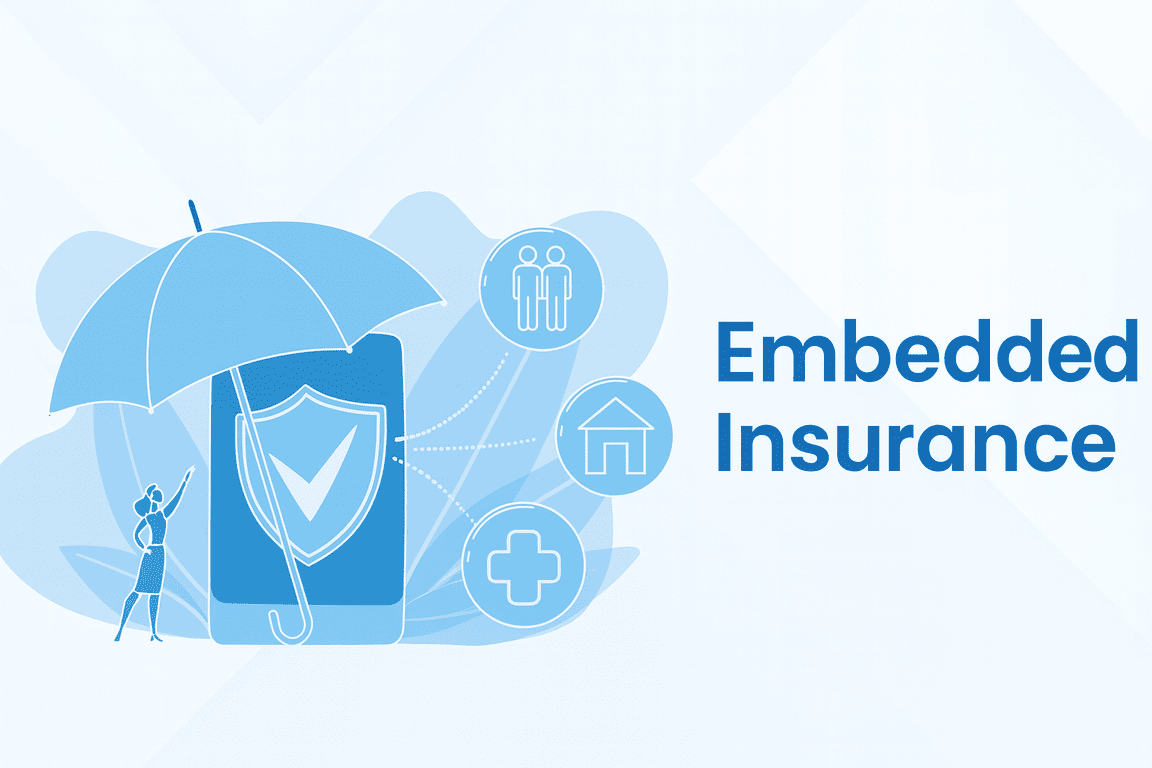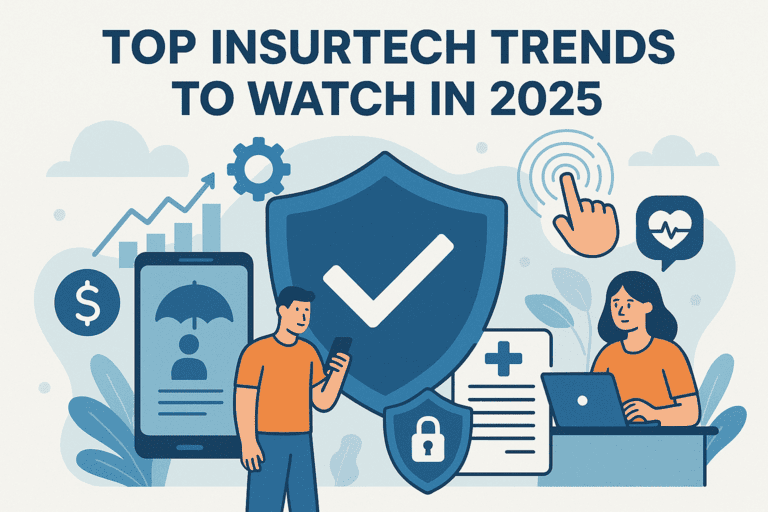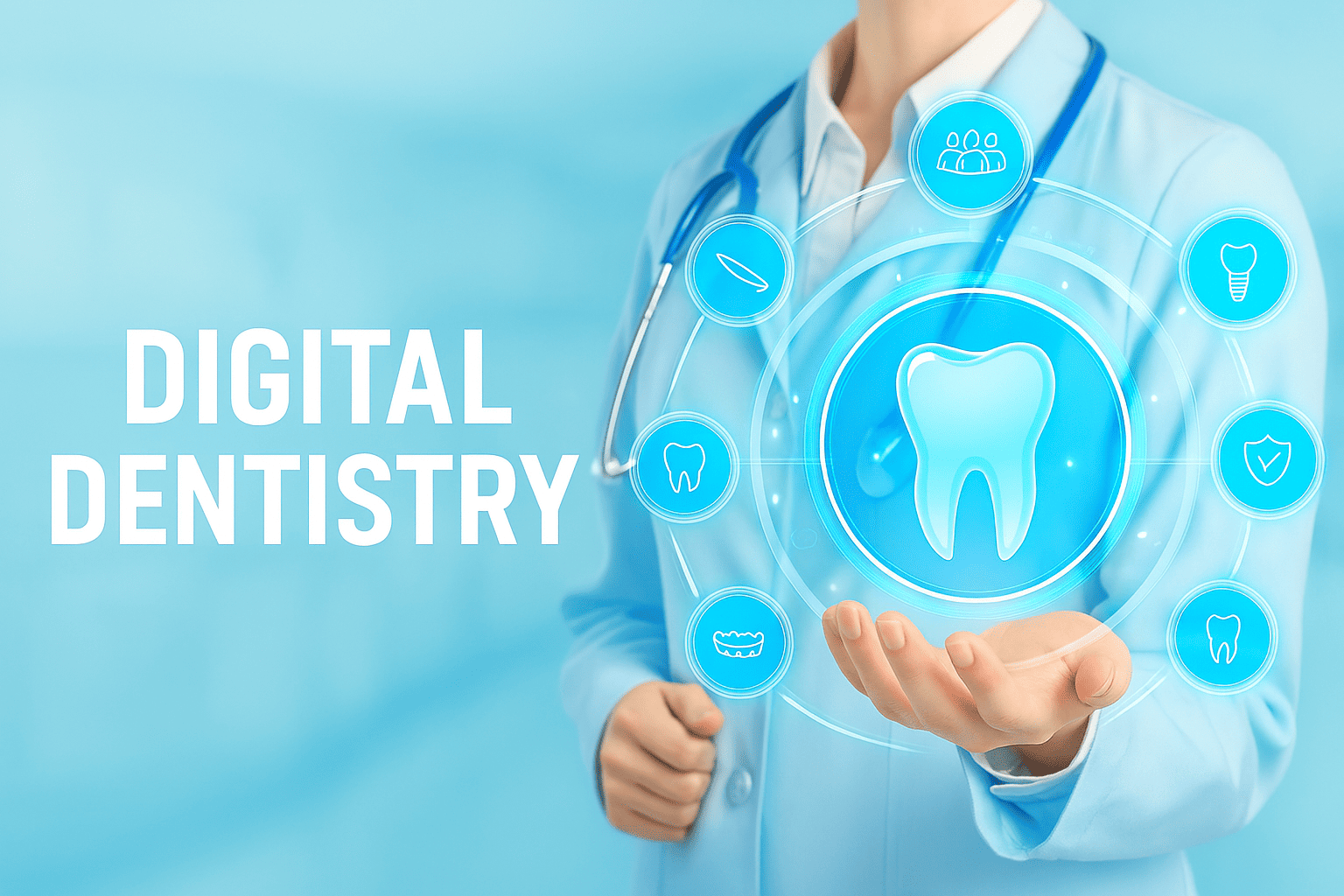Explore the top healthcare mobile app features to create a product that can make a difference. Read our ultimate guide to get valuable insights into health app development.
Table of contents:
- What Is a Healthcare App?
- Types of Medical Apps
- Benefits of Healthcare Apps for Doctors and Patients
- Must-Have Features in a Health Application
- Most Popular Healthcare Applications
- Main steps of the medical app development process
- Challenges You May Face When Creating a Medical Application
- Reasons Why Digital Health Apps Fail
- Conclusion
- FAQ
We live in the digital age, where technology permeates every aspect of our lives, healthcare being no exception. Convenient and easy to use, health apps revolutionize how people approach health and wellness. They offer a wide range of features to help users track their conditions, manage their health, and access essential medical resources. Health apps are becoming increasingly popular, driving startups to build new products that create value for users and bring revenue to their creators.
If you have an interesting idea for a medical app, stay on this page. In this article, we’ll explore types of medical apps, benefits they offer to doctors and patients, the top features to include in a healthcare mobile app, and even more. So let’s delve in and discover how to create a health app that can make a difference in people’s lives.
What Is a Healthcare App?
So what is an app in the medical field? A healthcare app is a software application designed to process health-related data, help users maintain their health, and track their conditions. Today, health apps are very versatile — they can solve a wide range of health-related pain points, from sleep pattern tracking to chronic disease management.
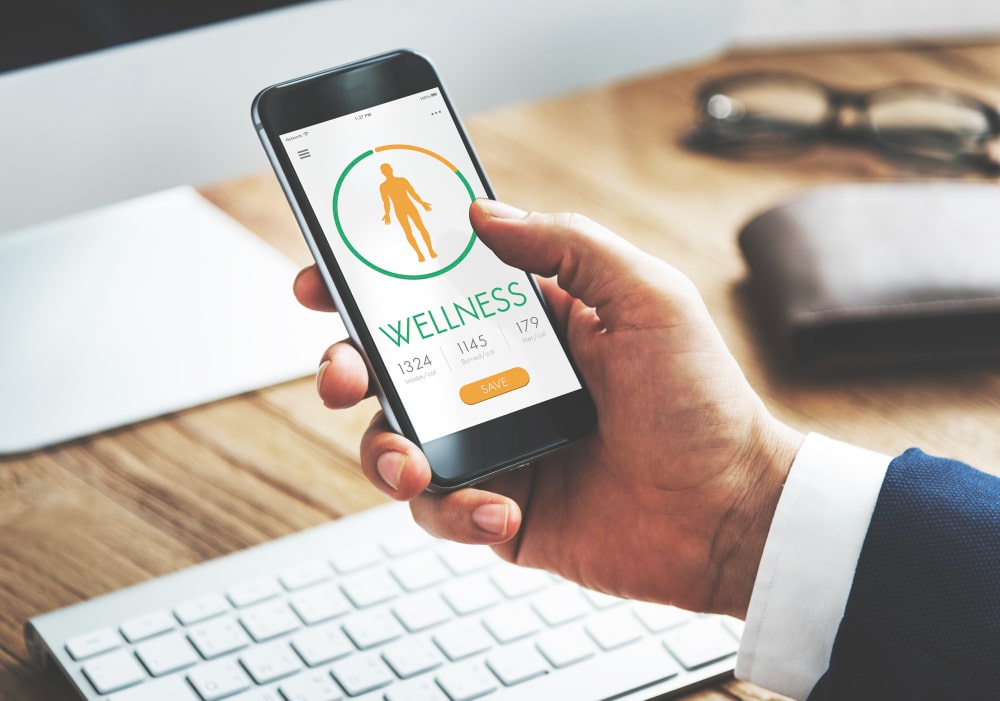
Types of Medical Apps
The impressive variety of mobile healthcare apps falls into three major categories. So before planning your solution, let’s look at the types of healthcare apps. These types sometimes overlap — for instance, telehealth apps are used by both patients and doctors, meaning they belong to two different categories at the same time.
Health Apps for Patients
The most popular of healthcare app types, digital health apps for patients allow individuals to effectively control their personal health and make informed decisions to lead healthier lives. This type of healthcare app includes:
- virtual doctor consultations
- medication reminders
- habit tracking apps
- fitness trackers
- symptom trackers
- appointment scheduling apps
- IoT solutions
- period tracker apps
- mental health apps
Health Apps for Providers
Healthcare providers use specialized applications to streamline healthcare delivery and enhance patient care. These apps typically offer electronic health records, secure communication channels, and clinical decision support tools, which help optimize efficiency and patient outcomes. Here are some most common types of health apps for providers:
- clinical communication apps
- clinical assistance apps
- patient portal solutions
- database apps
- appointment management solutions
- health records apps
- telemedicine apps
- remote monitoring apps
Health Apps for Medical Administration Staff
Health apps for medical administration staff are designed to simplify administrative tasks and streamline workflows, saving time, reducing errors, and improving overall operational efficiency. These include:
- doctor/nurse marketplaces
- EMR/EHR apps
- inventory management solutions
- billing and payment management apps
- patient registration platforms
Benefits of Healthcare Apps for Doctors and Patients
Mobile healthcare applications provide a multitude of benefits for both healthcare professionals and patients. Let’s explore them.
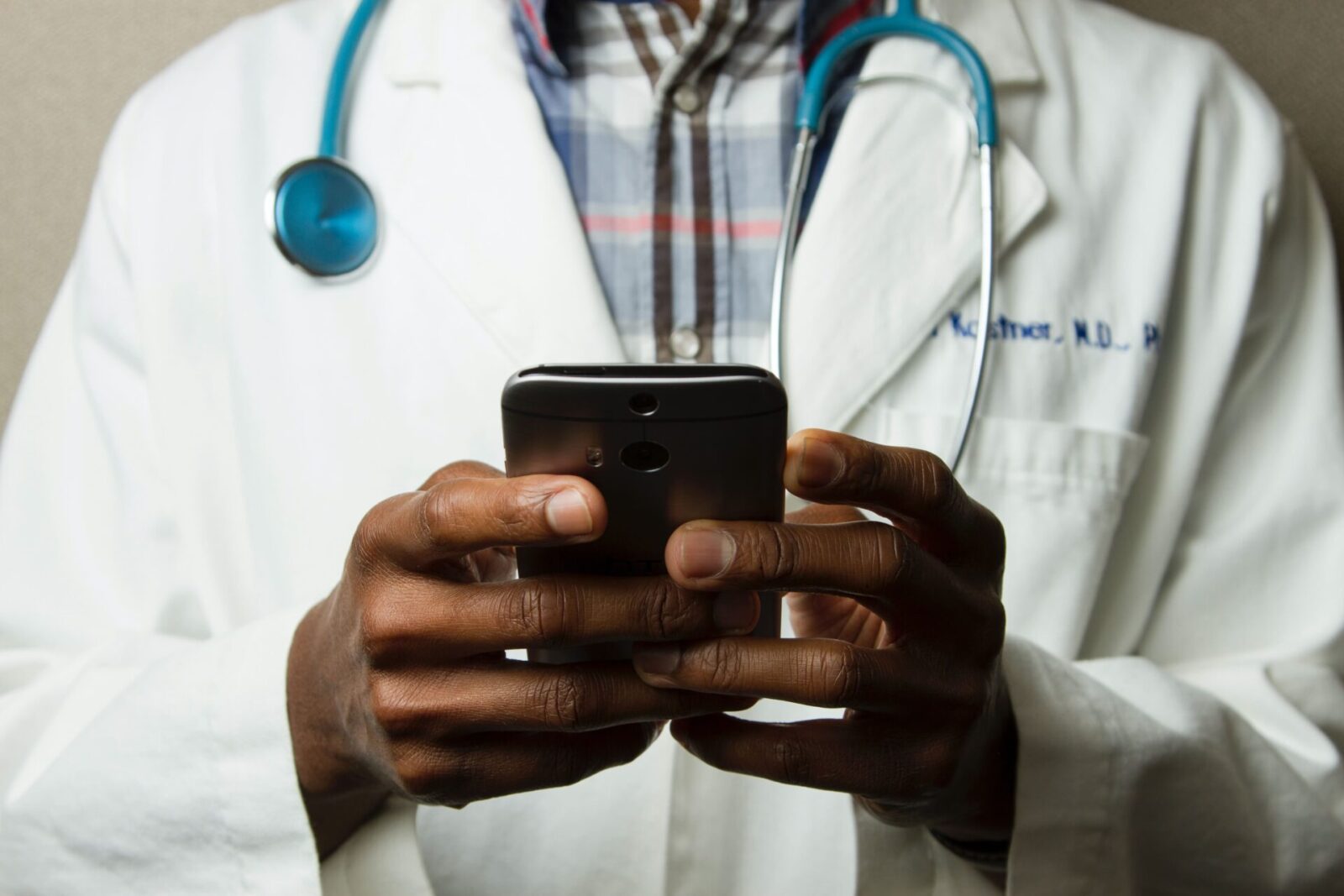
Benefits for Doctors
Enhanced patient management
Professional healthcare apps enable doctors to efficiently manage their patients’ health information. By using these apps, doctors can access medical records, review laboratory results, and manage treatment plans from their mobile devices, which allows them to make more efficient decisions, provide accurate diagnoses, and deliver personalized care.
Effective communication
Effective communication plays a vital role in providing quality healthcare. Healthcare apps facilitate seamless communication between doctors, patients, and other medical professionals. Thanks to secure messaging features, doctors can communicate with patients, provide medical advice, share test results, and answer questions. Moreover, medical applications allow doctors to collaborate with other specialists, ensuring timely and accurate information exchange for comprehensive patient care.
Time and resource optimization
Mobile health apps help doctors optimize the efficient use of time and resources, translating into considerable time savings and greater productivity. For instance, these apps can offer appointment scheduling, minimizing paperwork and administrative tasks and enabling doctors to focus on their primary responsibility — treating patients.
Benefits for Patients
Convenient access to healthcare
Healthcare apps provide patients with convenient access to healthcare services. Through these apps, people can receive real-time medical advice, book appointments, request prescription refills, and access their medical records right from their mobile devices. As a result, health apps remove the need for unnecessary travel, reduce waiting times, and enable patients to receive medical advice whenever they need it, enhancing overall patient satisfaction. Moreover, telemedicine features within healthcare apps allow patients to consult with healthcare professionals remotely, saving time and effort, especially for a non-emergency medical concern.
Easy health monitoring
With healthcare apps, patients can monitor and manage their health. Many apps offer features such as medication reminders, symptom tracking, and diet/exercise monitoring, empowering users to take control of their well-being. Patients can track vital signs, record symptoms, and share this information with their doctors for more accurate diagnoses and personalized treatment plans.
Educational resources
Healthcare apps often provide educational resources, including articles, videos, and interactive tools to educate patients on various health conditions and treatments. They allow patients to access reliable health information and make informed decisions about their health.
Must-Have Features in a Health Application
When it comes to digital health solutions, there are several essential features that can make a significant difference in delivering a seamless user experience. Here are the top healthcare mobile app features you should consider when planning a medical app.
Cloud integration
Cloud integration allows for secure storage and easy access to user data. In addition, cloud technology helps ensure that critical information, such as patient records and medical history, is available across multiple devices.
Integrations with Google Fit, HealthKit, and Samsung Health
Seamless integrations with widespread health and fitness platforms like Google Fit, HealthKit, and Samsung Health enable users to sync their health and activity data. Such integrations provide a comprehensive overview of the user’s health and fitness metrics, giving app users and medical personnel valuable insights.
User profile
This feature allows users to create and manage their profiles, including information such as age, gender, medical history, allergies, and current medications. It enables tailored recommendations and targeted healthcare information.
Dashboard
A comprehensive and intuitive dashboard provides users with an overview of their health data, including vital signs, activity tracking data, and progress toward health goals.
Telemedicine options
Integrating telemedicine options into a mobile app for healthcare enables users to schedule virtual appointments, consult with healthcare professionals remotely, and receive medical advice and prescriptions from the comfort of their homes.
Notification and reminders
Timely reminders and notifications ensure medication adherence, follow-up appointments, and health-related tasks. Push notifications, reminders for medication intake, upcoming appointments, and health-related milestones help users stay on track with their healthcare routine.
Messaging
The in-app messaging feature enables seamless communication between users. For example, patients can ask doctors questions, and medical staff members can communicate with each other in an app.
Customer support
A reliable customer support system is vital for addressing user queries, concerns, and technical issues. In addition, prompt and effective customer support enhances user satisfaction and trust in the health application.
Most Popular Healthcare Applications
Before detailing how to develop a health app, we suggest looking at the most popular products on the health apps market to get you inspired:
- Fitbit. This app connects to physical trackers and smartwatches. It monitors a user’s heart rate, tracks workouts, analyzes sleep patterns, provides nutrition insights, and offers activity tracking for a holistic approach to health and fitness.
- Headspace. Headspace is a meditation and sleep improvement app that utilizes clinical research to curate guided mindfulness meditation plans. It helps users enhance their meditation practice, improve sleep quality, and promote mental well-being.
- MyFitnessPal. MyFitnessPal is a popular nutrition-tracking app that lets users effectively manage their diet. It features a comprehensive food catalog that lets users quickly find nutrition information and track their calorie intake.
- WebMD. WebMD is a comprehensive telehealth app that allows users to check symptoms, find nearby doctors and specialists, schedule appointments, access medical condition information, and even save money by comparing prescription drug prices.
- Nike Training Club. This app offers a wide range of home workout routines and fitness programs for users of all levels, helping them stay fit without professional equipment.
- Daily Yoga. Daily Yoga is a genuinely versatile app that offers meditation, physical poses, stretches, and deep breathing exercises for physical and mental development.
- Medisafe. This pill reminder and medication tracking app helps users ensure they take their prescribed drugs on time.
Main steps of the medical app development process
Developing a medical app involves a systematic approach to ensure the app’s functionality, usability, and security. The medical app development process involves several major steps:

1. Ideation and research
The first step in medical application development involves generating an idea and conducting thorough research. You need to identify the problem the app aims to solve and assess the market demand for such a solution. Research also involves understanding the target audience and existing competitors, as well as exploring security regulations, privacy laws, and industry standards.
2. Planning and documenting requirements
Once the concept is solidified, you’ll need to create a comprehensive plan outlining the app’s features, functionalities, and user experience. At this stage, the development team closely collaborates with all the other stakeholders to define the app’s goals, target platforms, technology stack, and technical requirements. They prepare documentation, including project scope, wireframes, and user flow diagrams, to provide a clear roadmap for healthcare application development.
3. UI/UX design
The design phase consists in creating an intuitive user interface (UI) and a seamless user experience (UX). UI/UX designers develop visually appealing and user-friendly app screens, focusing on usability, accessibility, and seamless navigation within the app.
4. Mobile healthcare app development
At this stage, healthcare app developers build the app’s backend and frontend. Backend development involves setting up servers, databases, and APIs, while frontend specialists deal with implementing the UI/UX design. To minimize development time and cost, consider creating a Minimum Viable Product (MVP) — a scaled-down version of the app with essential features, which allows for early user feedback and validation of the concept.
5. Testing and quality assurance
Thorough testing is crucial to ensure the app’s functionality and performance and avoid security issues in the future. Having performed various types of testing, the healthcare mobile app development team fixes identified bugs, glitches, and compatibility issues to ensure a seamless experience for app users.
6. Deployment and release
Once the medical mobile app undergoes rigorous testing, it’s ready for deployment. Depending on the target platform, you’ll release the app on the selected app stores. At the same time, you’ll need to plan and implement a marketing strategy to generate awareness and promote your app.
7. Post-launch monitoring and maintenance
Once the health mobile application goes live, the development team monitors its performance and gathers feedback from real users. By analyzing user data and engagement metrics, you can identify areas for improvement and plan future updates. Keep in mind that to run smoothly, digital products need continuous updates, fixing bugs, adding new features, and enhancing security.
Challenges You May Face When Creating a Medical Application
Mobile health application development is associated with some unique challenges that require careful consideration and expertise. Developing digital healthcare products involves navigating a complex landscape where accuracy, security, and user experience are crucial.
One of the key challenges is ensuring the application’s compliance with the healthcare industry regulatory standards, such as HIPAA or GDPR, to safeguard patient data privacy and security.
Another significant challenge consists in creating a user-friendly interface that seamlessly integrates with various devices and platforms. This requires advanced technical skills and extensive testing.
In addition, the team at a healthcare app development company should be able to address the diverse needs of both healthcare professionals and patients while maintaining intuitive navigation and functionality.
Reasons Why Digital Health Apps Fail
While the benefits of mobile apps in healthcare are hard to underestimate, not all mobile products of this kind achieve the desired impact and often fail to meet user expectations. Let’s look at the main reasons healthcare startups fail.
Failure to solve user’s problems
Users won’t find an app valuable unless it solves their pain points. If it doesn’t, you’ll risk that your app will be quickly forgotten. That’s why it’s vital to focus on the problem that needs to be solved when planning a healthcare mobile app platform.
Poor UX
Get this: by building a mobile app for healthcare, besides healthcare experiences, you’re creating digital ones. Users expect apps to be accessible and easy to use. Otherwise, it will be impossible for you to attract and retain a stable user base.
Lack of industry expertise
Healthcare app development demands strict security and regulatory compliance. If you don’t do enough research in this field, all your effort might go to waste as your application will be put on hold.
Conclusion
By incorporating the right features and functionalities, a well-designed healthcare app can empower healthcare professionals and patients to improve the quality of care and enhance overall well-being.
From convenient access to healthcare services to streamlined administrative tasks, the benefits of healthcare apps are vast. However, creating a successful medical app requires careful planning, adherence to regulatory standards, and a deep understanding of user needs.
By following the main steps of the development process and addressing potential challenges, you can create a healthcare mobile app that meets market demands and delivers value to its users.
FAQ
What are apps in healthcare?
A healthcare app is a software application designed to enhance healthcare delivery, provide health-related information, facilitate communication between patients and healthcare professionals, monitor health conditions, offer medication reminders, track fitness activities, etc.
How are apps used in healthcare?
Apps are extensively used in healthcare to streamline processes, improve access to medical information, enhance patient engagement, and promote efficient healthcare delivery. For example, they can facilitate telehealth consultations, enable remote patient monitoring, track vital signs, offer personalized health recommendations, provide access to electronic health records, offer medication management tools, and assist in managing chronic illnesses.
What features should a health app include?
Besides secure forms of user authentication and an intuitive user interface, depending on its goals, a health app can include personal health data tracking, medication reminders, appointment scheduling, health information resources, secure messaging, seamless integration with wearable devices or other health monitoring tools, telehealth capabilities, electronic health record integration, and personalized health recommendations.
What are health app disadvantages?
Health apps come with certain disadvantages, including concerns regarding data privacy and security, potential inaccuracies in health information provided by apps, limited regulatory oversight, and lack of standardization.
How long does it take to develop a medical app?
Creating a custom healthcare application can take from several months to a year or more.
